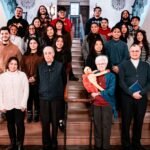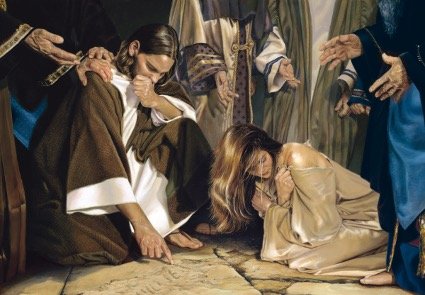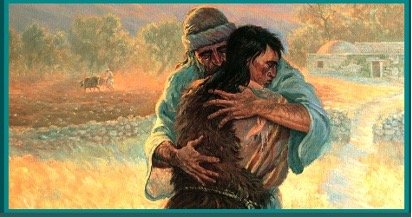
By F. Luis Casasus, General Superior of idente missionaries
Commentary on the Sunday Gospel of 29-10-2017, Twenty-nintth Sunday in Ordinary Time (Book of Exodus 22:20-26; 1 Thessalonians 1:5c-10; Saint Matthew 22:34-40)
We always find reasons and pretexts not to love one another. That seems to be part of our ego. We don’t look for sin but we often avoid the good that we could do. Today we are reminded that the foundation of this commandment of love is found also in the Old Testament: for you were once aliens yourselves in the land of Egypt. Because they, who were the marginalized of society, had been loved unconditionally by God. Jesus makes it clearer to us.
The Gospel of Matthew today once again generalizes: love God and love your neighbor. We can recall the story of the Good Samaritan to remind us that our neighbor is everyone who is in need in any way. This is a call to universal love. It is not an invitation to try to figure out those whom we don’t have to love.
In a family or in a religious community or in a parish community, it is not easy to love those who reject the way of life of the family, of the religious community or of the parish (mainly individualists and proud people). Loving these people does not mean rejecting the way of life handed down to us. It does mean seeking ways to love those who reject it. This is part of the ongoing challenge of following Jesus Christ. Let us see three simple stories describing three important features of God’s love and the love He is asking us to live.
Serendipity is a fashionable word nowadays. Is the effect by which one accidentally stumbles upon something truly wonderful, especially while looking for something entirely unrelated. God’s love is surprising and astonishing. God’s love comes without warning. How many times we feel that He makes a way when there seems to be no way? Here is our first story:
Dr. Richard Teo was a general medical practitioner turned cosmetic surgeon; he died on October 2012, after being diagnosed with lung cancer.
In the beginning, just like many people, he thought of happiness in terms of success, and success was about wealth. As a young doctor, he saw that becoming a cosmetic surgeon was the fastest way to success and wealth. So instead of healing the sick and the ill, he shifted to glorifying aesthetic looks. True enough, after a year, he was raking in millions and could very well afford the luxuries of life. Then in March 2011, at the pinnacle of life according to the world’s standards, he was diagnosed with lung cancer. He got very depressed and realized that his success and everything that he had acquired could not give him genuine happiness and joy.
Dr. Teo said that as a doctor, he should have been steeped in compassion even for non-human creatures, but he was not and could not. In fact, his exposure to sufferings and deaths in the cancer department as a young doctor deadened his feelings and capacity to empathize. Everything became simply a job for him. While he knew all the medical terms to describe the sufferings of people, how they felt and what they were struggling through, in truth, he did not really know how they felt…until he became a cancer patient himself. He said that if he could only relive his life, he would have been a different doctor – a truly compassionate one. A cancer patient himself, he began to understand how other patients felt, something that he learned the hard and irrevocable way.
Dr. Teo reminded young doctors never to lose their moral compass along the way of life and in the practice of their professions, something that he lost as he got obsessed with wealth, viewing his patients as merely sources of income. As doctors, they should serve people and have compassion on the sufferings of their patients. Society and media should not dictate on them how they should live.
This is also our experience: true happiness does not come from serving oneself but from serving others. And it comes from knowing God, not simply knowing God but knowing God personally, and having a genuine relationship with God, sharing with Him everything. Dr. Teo really learned it in an unexpected way.
God’s love is really powerful and transforming. It goes beyond our efforts, beyond the plans of the saints. Here is a story of Saint Anthony, showing how the Holy Spirit makes miracles (mostly invisible miracles) with our humble dedication:
Anthony the Great is the fourth-century leader of Egyptian monasticism. A Wise older monk and a young novice would journey each year into the desert to seek the wisdom of Anthony. Upon finding him, the monk would seek instruction on the life of prayer, devotion to Jesus, and his understanding of the Scriptures. While the monk was asking all the questions the novice would simply stand quietly and take it all in. The next year the well-worn monk and the young novice again went into the desert to find Anthony and seek his counsel. Again the monk was full of questions, while the novice simply stood by without saying a word. This pattern was repeated year after year. Finally, Anthony said to the young novice: Why do you come here? You come here year after year, yet you never ask any questions, you never desire my counsel. Why do you come? The young novice spoke for the first time in the presence of the great saint: It is enough just to see you. It is enough for me just to see how you treat my superior.
Truly, everything depends on the commandment of love. Moreover, God’s love and our love are intimately and integrally related. Erik Erikson (1902-1994) was a very influential developmental psychologist who described the stages of human psychosocial development. Interestingly, the very first stage of our development, Trust versus Mistrust, occurs between birth and 18 months of age. Thus, for this author, the bedrock on which all of the other psychosocial development occurs is trust versus mistrust. Trust develops in the child as its needs are met. For instance, a child has a wet or soiled diaper, it cries, a person comes in response to the cry and changes the diaper. When this call and response happens consistently, trust develops and mistrust is kept at a minimum.
If this stage is completed successfully, then trust is transformed by the Holy Spirit into the virtue of hope. If not, a feeling of mistrust dominates the child and fear develops as the prominent worldview.
Perhaps the next story can illustrate the meaning of loving with all your heart, with all your soul, and with all your mind.
A professional tightrope walker stretched a tightrope across a portion of Niagara Falls and advertised that he was to walk across the tightrope. A crowd gathered to watch the man walk on the tightrope. He asked the crowd if the “believed” that he could do it. They joined in with an enthusiastic, “Yes!” Being the professional that he was, he got on the rope and walked across and returned with ease. Then he took a wheelbarrow and put it on the rope and asked if the crowd “believed” that he could push it across the tightrope. Again the crowd responded with, “Yes.” Again the professional pushes the wheelbarrow across and returns. This time he asks if the crowd “believed” that he could push the wheelbarrow across with a man in the wheelbarrow. Again the crowd responded with, “Yes.” Then tightrope walker turned to an unsuspecting soul and asked, “Do you believe that I can do it?” The individual responded with, “Yes, I believe you can do it.” The professional then solemnly says, “Step into the wheelbarrow.” This is where one puts “I believe” to action.
This is the prayer of our unitive faculty and the fully ecstatic behavior. If you really believe that Jesus is the Lord who has become Savior, then you will put yourself into his hands that he may save you and take you now, right now, through progressive acts of love, to the kingdom of heaven.
Matthew’s gospel tells the story of Peter’s conversion, but it is not a conversion to particular beliefs. It is a movement from head to heart to hands. Jesus starts by asking a very general question: who do people say that I am? Peter gives the orthodox answer for his day: People say that you are the reincarnation of Elijah, John the Baptist or Jeremiah. Then Jesus pushes Peter to self-awareness: Who do YOU say that I am? Peter says: You are the Messiah. Finally Jesus pushes beyond words and beliefs to actions. He says to Peter: Now be a Messiah yourself. Be a rock on which others can build their lives.
We see how quickly Jesus moves Peter from belief to action, from a declaration of belief to a mission of apostolate. That’s the fascinating part of this passage. The message of Jesus is: You will move from one who makes a statement of faith to one who embodies and enacts faith. He always quickly moves us from affirmation of faith to embodiment, enacting faith. We are reminded that Jesus never said, at the end of one of his sayings, parables or teachings: Do you agree? or Doesn’t that make sense? Rather, what he said was: Follow me.
Yes; Jesus says to His disciples: If any want to become my followers, let them deny themselves and take up their cross daily and follow me. This is the real turning point for you and me; moving from belief to action. You and I decide whether or not to follow Christ.
How many times have we listened to the following argument: You’re a Christian, I am an atheist. Tell me, what difference does your belief in God make in the way you treat others? In the way you spend your money?
It may be only a minor act on your part. What matters the most is that you take some action in His name. You cross over an invisible line from belief to action. It is now clear that you are the person, this is the vision of the divine will, and now is the time. This is the beginning of a true knowledge of God, a real dialogue with the Most Holy Trinity.
To make this love a reality in our life, we must return to the foundation, which is our relationship with God cultivated through prayer. When we pray, it is not simply to meditate on the virtues of Christ, or to try to imitate Him or make our daily checkup to see our failures. Of course these dimensions are necessary. But essentially, prayer is to be with God and to allow ourselves to bask in His unconditional love, responding with the daily offering of our life. Only then can we find our true selves and be healed of our brokenness. Only when we have experienced Him, can we then proclaim Him to others.











